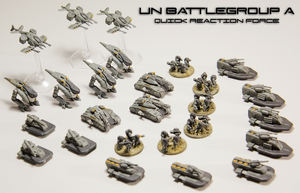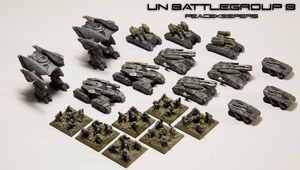In the Story of Polyversal, the United Nations (UN) is a powerful governing body. The UN controls the technology for mass evacuation, but it is only made available to the rich and powerful within nations that cede their sovereignty. The UN fights to protect this technology, their power, and their member nations in the name of Peacekeeping.
1945 - 20XX: Nongovernmental Organization[]
The United Nations was founded in 1945, following the ratification of its Charter by the five permanent members of the Security Council, and 46 other member states. For the first XXX years of its existence, the UN operated as an international nongovernmental organization. The UN had no authority to make or enforce laws, but served instead as a forum for global consensus-building.
20XX: UNification[]
As the first half of the twenty-first century progressed, various reforms made their way through the UN system, beginning with the addition of ___ more permanent members of the Security Council in 20XX. By 20XX, the UN Quick Reaction Forces were formally created, though they would not reach full power for several years. Critically, in 20XX, the permamanent members of the Security Council each voted to cede national soveriegnty to the United Nations.
Research and Development[]
Section to be added...
Organization[]
The UN operates as a federal-style government uniting its member states. The UN's seven principal organs work together to perform the legislative, executive, and judicial functions of a united Earth government.
Secretariat[]
The executive functions of the UN are carried out by the vast Secretariat, presided over by the Secretary-General.
Security Council[]
The UNSC is charged with ensuring international peace and security, accepting new members to the United Nations, and approving any changes to its charter. Its powers include the establishment of peacekeeping operations and international sanctions as well as the authorization of military actions through resolutions.
It is comprised of ambassadors from 25 member states, who serve rotating terms of two years. As a pre-condition to service on the UNSC, a member state must be one of the 50 largest contributors to the peacekeeping forces of the UN.
General Assembly[]
UN laws are made by a bicameral legislature, similar to the governments of many of its member states. The original UN General Assembly, in New York, serves as the government's 'upper house,' with voting ambassadors appointed by the heads of state of its member states, with each member state having one vote.
Parliamentary Assembly[]
The 'lower house' of the UN, added by the reforms of UNification, is the UN Parliamentary Assembly, in Nairobi, Kenya. Members of the UNPA are directly elected by the citizens of member-states, and are awarded proportionally, by population.
International Courts of Justice[]
The International Court of Justice in the Hague is the court of last-resort for all legal disputes arising in the courts of UN member states, with the power to determine whether the rulings of member states' courts are consistent with the Charter and Laws of the United Nations.
Economic and Social Council[]
ECOSOC is responsible for the coordination and functioning of the global economy, including the World Bank, and the International Monetary Fund.
Trusteeship Council[]
The Trusteeship Council was initially established to help ensure that trust territories were administered in the best interests of their inhabitants and of international peace and security. At the time of its founding, the trust territories were mostly former mandates of the League of Nations or territories taken from nations defeated at the end of World War II, and went on to achieve self-government or independence, either as separate nations or by joining neighboring independent countries. Following the independence of Palau in 1994, the UNTC went dormant until the chaos of the twenty-first century once again left certain regions without stable or functioning government. The UNTC not only oversees certain trust territories on Earth, but it is tasked with primary oversight of extra-terrestrial territories, including the Moon, Mars, the Asteroid Belt, and any other off-world colonies to come, all of which are claimed by the United Nations, in trust, for the good of all peoples.
Military Units[]

UN Quick Reaction Force
Quick Reaction Forces[]
The United Nations maintains seven standing Quick Reaction Forces in locations around the globe. In addition to traditional ground and naval installations, each QRF maintains a geosynchronous satellite in orbit above its area of operations. Aboard each UNQRF satellite is an elite unit of drop troops with equipment specially suited for deployment from orbit on a moment's notice. As a result, a UNQRF can be on location with little or no warning, and are trained to quickly secure and hold hotspots until traditional UN Peacekeepers can arrive in-theatre.
|
Satellite |
AoR |
Unit |
|
UNS Everest |
Asia |
UNQRF1 “The Black Dragon” |
|
UNS Aconcagua |
South America |
UNQRF2 “The Terrible Twos” |
|
UNS Denali |
North America |
UNQRF3 "Death From Above" |
|
UNS Kilimanjaro |
Africa |
UNGRF4 “The Storm” |
|
UNS Elbrus |
Europe |
UNQRF5 "Thunderbolts" |
|
UNS Vinson |
Antarctica |
UNQRF6 “The Polar Express” |
|
UNS Puncak Jaya |
Oceania |
UNQRF7 "The Drop Bears" |
UNQRF teams distinguished themselves during the early years of the UNification, quelling various rebellions and separatist uprisings, and bringing terrorists to heel.
Peacekeepers[]
The more traditional, and considerably larger arm of the UN miilitary, are the Peacekeepers.

UN Peacekeepers.